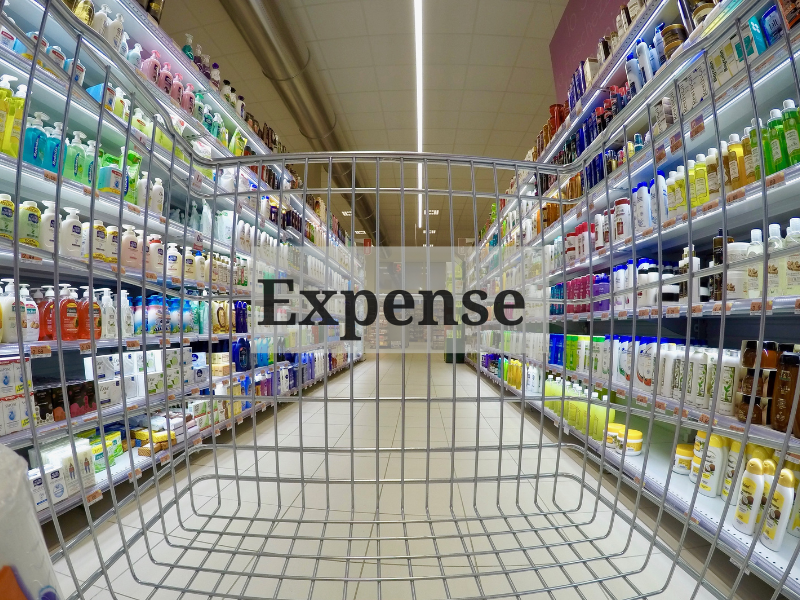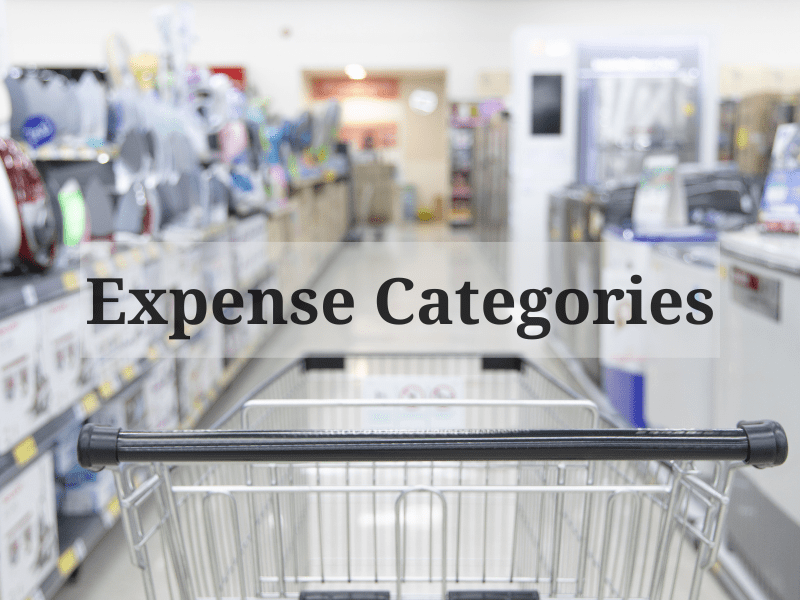When it comes to financial planning, one of the key elements that often gets overlooked is organizing expenses into categories. Expense categories play a crucial role in helping individuals and households effectively manage their finances and make informed decisions about budgeting and spending.
By categorizing expenses, individuals can gain a clearer understanding of where their money is going and identify areas where they may be overspending or underspending. This level of organization allows for better control over personal finances and helps establish a solid foundation for financial planning.

Expense categories provide a structured framework for tracking and analyzing expenses, allowing individuals to allocate funds appropriately based on priorities and goals. Whether it’s housing, transportation, food, entertainment, or any other expense category, breaking down expenditures helps paint a comprehensive picture of overall spending habits.
Moreover, expense categories enable individuals to create realistic budgets tailored to their specific needs. By setting limits within each category, individuals can ensure that they are allocating funds in alignment with their financial goals while avoiding unnecessary debt or overspending.
Furthermore, having well-defined expense categories simplifies the process of monitoring financial progress over time. It becomes easier to track changes in spending patterns and identify areas where adjustments may be necessary.
Table of Contents
Understanding the Role of Expense Categories
Expense categories play an integral role in effective financial planning by providing structure, organization, and insights into personal finance management. By allocating funds strategically within these categories and regularly reviewing expenditure patterns, individuals can gain greater control over their finances and work towards achieving long-term financial stability.
When it comes to managing our finances, understanding and categorizing our expenses is crucial. By organizing our spending into different categories, we can gain valuable insights into where our money is going and make informed decisions about budgeting and saving.
There are several common expense categories that most individuals encounter in their daily lives. These include personal expenses, household expenses, transportation expenses, and entertainment expenses.

Personal expenses encompass items such as groceries, clothing, healthcare costs, and personal care products. Household expenses cover rent or mortgage payments, utilities like electricity and water bills, as well as home maintenance and repairs.
Transportation expenses include costs related to owning a vehicle or using public transportation. This category may include fuel or gas costs, car insurance premiums, parking fees, public transportation fares, or even vehicle maintenance.
Lastly, entertainment expenses involve any discretionary spending on activities like dining out at restaurants, going to the movies or concerts, purchasing books or music albums, or subscribing to streaming services.
To effectively categorize your expenses:
- Start by reviewing your bank statements and credit card bills to identify recurring expenditures.
- Create a list of expense categories that align with your specific financial situation.
- Assign each expense item to the appropriate category based on its nature.
- Regularly review your categorized expenses to track patterns and identify areas where you may need to adjust your spending habits.
By categorizing your expenses thoughtfully and consistently over time, you will be better equipped to understand your financial habits and make more informed decisions about how you allocate your resources.
Creating customized expense categories is a crucial step in effective budgeting and tracking your expenses. By tailoring your categories to suit your specific financial situation, you can gain better control over your spending habits and work towards achieving your financial goals.
To begin, take a close look at your spending patterns and identify the areas where you allocate the most funds. This could include groceries, transportation, entertainment, or even miscellaneous expenses. By breaking down these broad categories into more specific subcategories, you can gain a clearer understanding of where exactly your money is going.
Consider personalizing your expense categories based on what matters most to you. For example, if saving for a vacation is one of your financial goals, create a separate category specifically for travel expenses. This allows you to track how much you’re allocating towards this goal and make adjustments as needed.
Furthermore, don’t be afraid to get creative with your expense categories. If traditional labels don’t accurately reflect certain expenses in your life, feel free to customize them accordingly. For instance, instead of using “entertainment,” you could use “self-care” or “hobbies” to better capture the essence of those expenditures.
Regularly reviewing and updating these customized expense categories is essential as well. As your financial situation evolves and priorities shift, it’s important to ensure that your budgeting system remains aligned with your current needs.
By creating personalized expense categories that suit your financial situation and align with your goals, you’ll have a powerful tool at hand for effectively managing and tracking expenses. Remember that the key lies in finding what works best for you and adapting as necessary along the way.
The Impact of Expense Category Tracking on Effective Money Management
Tracking expenses by categories is a powerful tool that can greatly assist in managing your money effectively. By organizing your expenses into different categories, you gain valuable insights into where your money is going and can make informed decisions about your spending habits.
Financial management tools and expense tracking apps have made it easier than ever to track expenses by categories. These tools allow you to categorize each expense, such as groceries, utilities, entertainment, and more. This level of detail provides a clear picture of how much you are spending in each category, allowing you to identify areas where you may be overspending or where you can potentially cut back.

One of the key benefits of tracking expenses by categories is that it helps you create a budget that aligns with your financial goals. By understanding how much money is allocated to each category, you can set realistic spending limits and ensure that you are not overspending in any particular area.
Additionally, tracking expenses by categories allows for easy analysis and comparison over time. You can easily see trends in your spending habits and identify any areas where costs may be increasing or decreasing. This information can help you make adjustments to your budget as needed and ensure that your financial goals remain on track.
Utilizing financial management tools and expense tracking apps to track expenses by categories offers numerous benefits for effective money management. It provides clarity on spending patterns, aids in creating a budget aligned with financial goals, and allows for easy analysis of expenditure trends over time. By harnessing these tools, individuals can take control of their finances and make informed decisions about their spending habits.
When it comes to tax planning and reporting, understanding expense categories is crucial. By properly categorizing expenses, individuals and businesses can ensure they are maximizing their deductions and complying with tax regulations.
Expense categories play a vital role in tax planning as they help identify which expenses are deductible. By organizing expenses into appropriate categories such as business expenses, travel expenses, or home office expenses, individuals and businesses can accurately calculate their taxable income.
Moreover, expense categories provide a clear structure for reporting purposes. When filing taxes, having well-defined expense categories simplifies the process of documenting and reporting deductible expenses. This not only saves time but also reduces the risk of errors or omissions in tax filings.
By effectively utilizing expense categories in tax planning and reporting, individuals and businesses can optimize their financial strategies while ensuring compliance with tax laws. It allows them to take advantage of legitimate deductions while maintaining accurate records for future reference or potential audits.
Understanding the role of expense categories is essential for effective tax planning and reporting. Properly categorizing deductible expenses not only helps maximize deductions but also ensures compliance with tax regulations.
Utilizing Technology for Seamless Management of Personal and Business Expenses
In today’s fast-paced world, managing personal and business expenses can be a challenging task. However, with the advent of technology, there are now numerous tools and apps available to help us efficiently track and categorize our expenses.
Expense tracking tools/apps have become increasingly popular as they offer convenience and simplicity in managing our financial records. These tools not only save time but also provide valuable insights into our spending habits, helping us make better financial decisions.

One such tool is [Tool Name], which allows users to effortlessly track their expenses on the go. With its user-friendly interface and intuitive features, it enables users to categorize their expenses into customizable categories for easy analysis.
Another popular app in this space is [App Name], which offers a comprehensive expense tracking system that syncs seamlessly across multiple devices. It provides real-time updates on spending patterns, generates detailed reports, and even offers budgeting features to help users stay on top of their finances.
Furthermore, Tool/ App Name provides additional functionalities such as receipt scanning capabilities or integration with banking platforms for automatic expense syncing. These features further streamline the expense tracking process and eliminate the hassle of manual data entry.
These expense-tracking tools/apps have revolutionized the way we manage our financial records. By leveraging technology, we can now efficiently track and categorize our expenses with ease, ultimately empowering us to make informed financial decisions.
By organizing your expenses into clear categories, you can take control of your finances and make more informed decisions about your spending habits. This simple yet effective strategy allows you to see where your money is going and identify areas where you may be overspending or could potentially save.
Creating clear categories for your expenses helps you to track and analyze your financial patterns. By grouping similar expenses together, such as groceries, utilities, entertainment, and transportation, you can easily assess how much money is allocated to each category on a monthly basis.
Moreover, organizing your expenses into categories provides a visual representation of where your money is being allocated. This visual clarity enables you to make adjustments and prioritize certain areas of spending based on your financial goals.
Taking control of your finances through categorizing expenses also promotes accountability and mindfulness in managing your money. By actively tracking and categorizing every expense, you become more aware of how each purchase impacts your overall financial health.
By organizing your expenses into clear categories, you empower yourself to gain control over your finances. This approach enables better decision-making by providing insights into spending patterns and identifying areas for improvement. By implementing this simple yet powerful strategy, you can pave the way towards financial stability and achieve greater peace of mind when managing your money.
Also Read: A Comprehensive Guide to Tracking Your Spending: Mastering Your Finances

